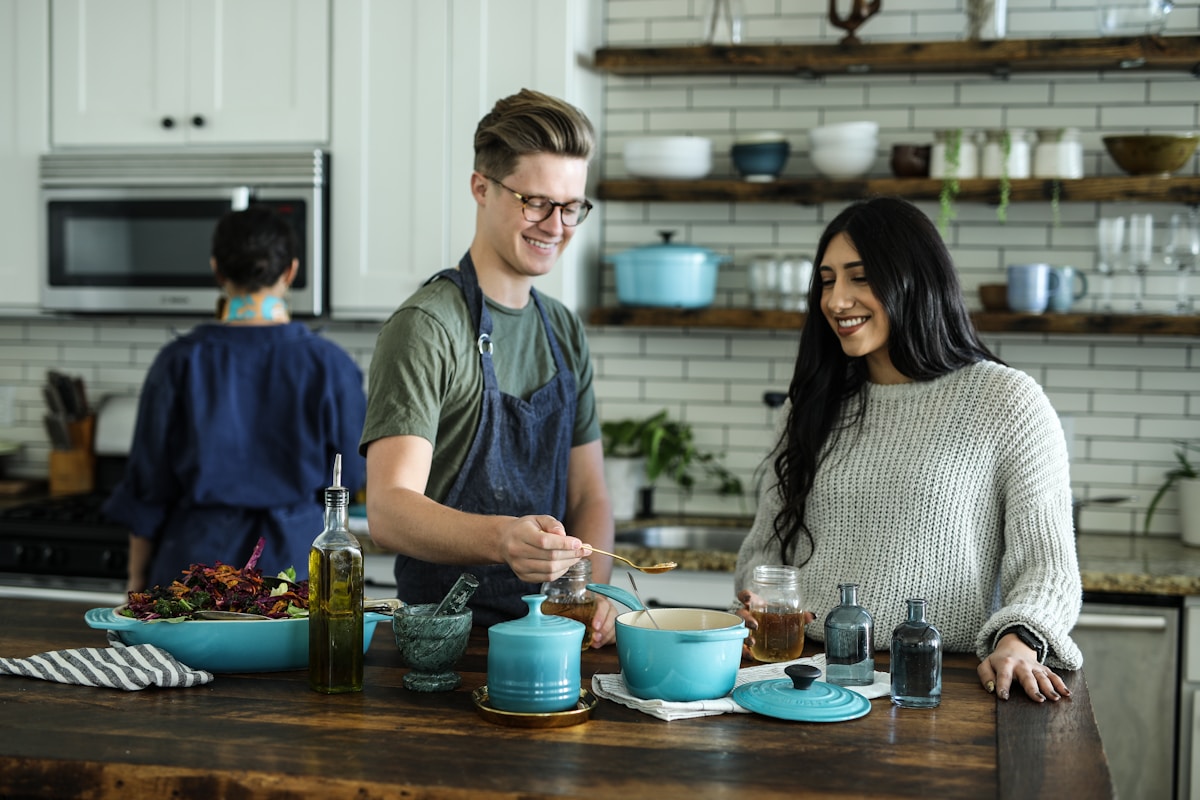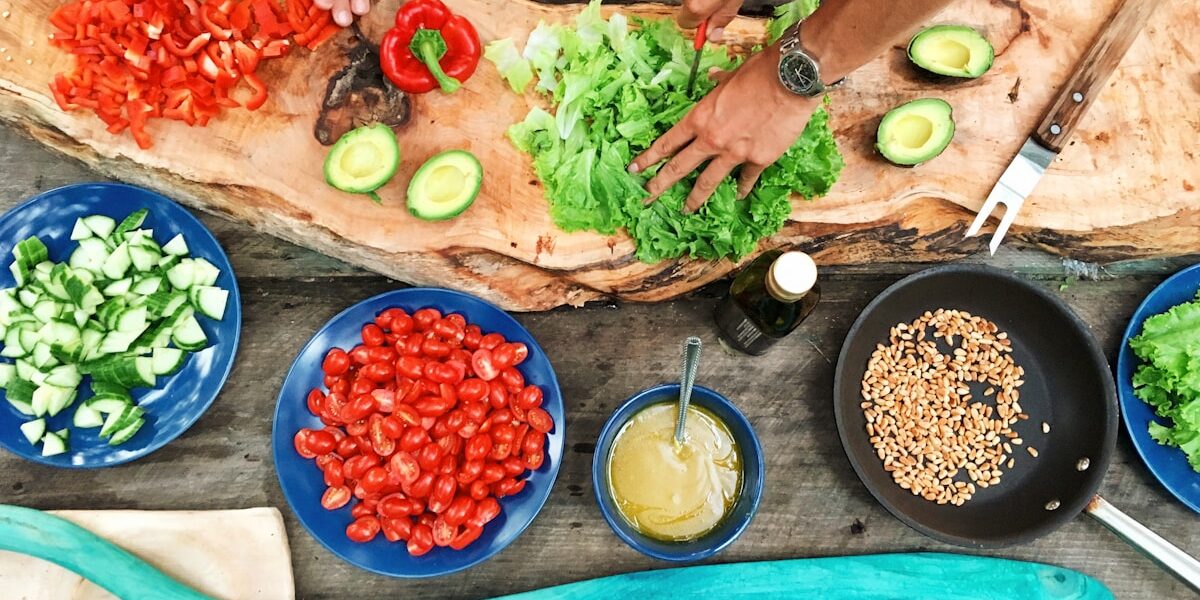Top Cooking Tips
Knowing some essential cooking tips can significantly improve your culinary skills. Understanding how to handle your ingredients, cookware, and cooking techniques will help you prepare delicious meals efficiently.
🎯 Recommended Products
Based on extensive research and customer reviews, these highly-rated products are worth considering:
💡 Amazon affiliate links – We earn from qualifying purchases at no extra cost to you
Prep Everything Before You Start

Prepare all your ingredients before turning on the heat. This is known as mise en place in French, meaning everything in its place. Chop vegetables, measure out spices, and get everything ready. It helps you cook more efficiently and avoids the stress of finding ingredients while cooking.
Use Sharp Knives
A sharp knife is safer than a dull one. It requires less force to cut through food, making you less likely to slip and cut yourself. Invest in a good quality knife and keep it sharp. Learn how to sharpen your knives with a honing steel or a whetstone regularly.
Season As You Go
Season your food throughout the cooking process, not just at the end. This allows the flavors to build and blend better. Taste your food at different stages and adjust the seasoning accordingly. Use salt, pepper, and other spices to enhance the natural flavors of your ingredients.
Don’t Overcrowd the Pan
Giving your ingredients enough room in the pan allows them to brown properly. Overcrowding causes steaming instead of searing, leading to less flavorful and often soggy food. Cook in batches if necessary.
Learn Basic Knife Skills
Good knife skills can speed up your prep times and make your cuts more consistent. Practice techniques such as chopping, slicing, dicing, and julienning. Hold the knife properly and use a cutting board that doesn’t slip.
Keep Your Workspace Clean
Maintain a clean and organized workspace to avoid cross-contamination and make the cooking process smoother. Clean as you go, washing utensils, cutting boards, and surfaces after each use. It’s easier to work in a tidy kitchen, and it ensures that your food remains safe.
Understand Cooking Methods
Familiarize yourself with various cooking methods such as roasting, grilling, sautéing, steaming, and braising. Each method imparts different flavors and textures to the ingredients. Choosing the correct method is crucial for the success of a dish.
Read Recipes Thoroughly
Before you start cooking, read the entire recipe. Ensure you understand all steps and have the ingredients and equipment ready. This prevents surprises and mistakes while cooking. Familiarize yourself with cooking terms and techniques mentioned in the recipes.
Use Fresh Ingredients
Fresh ingredients make a significant difference in the flavor of your dishes. Whenever possible, choose fresh over canned or processed items. Seasonal produce often has the best taste and nutritional value.
Don’t Rush the Process
Good food takes time. Allow your dishes to cook properly without rushing. This is particularly important for methods like braising and slow cooking, where time allows flavors to develop fully.
Taste As You Cook
Consistently tasting your food as you cook lets you adjust seasoning and ingredients. It helps ensure the final dish is well-balanced and flavorful. Always use a clean spoon for tasting to keep hygiene standards high.
Let Meat Rest
After cooking meat, let it rest before cutting into it. This allows the juices to redistribute throughout the meat, resulting in a juicier and more flavorful dish. Typically, a rest of about 5-10 minutes is sufficient.
Invest in Quality Cookware
Quality cookware can enhance your cooking experience and the results. Non-stick pans, cast iron skillets, and stainless steel pots can handle various cooking tasks efficiently. Good cookware ensures even heat distribution and durability.
Use a Thermometer
A digital thermometer helps ensure your meat and baked goods are cooked to the correct temperature. This tool prevents undercooking and overcooking. Follow recommended internal temperatures for different types of meat to ensure food safety and optimal taste.
Embrace Herbs and Spices
Herbs and spices add depth and complexity to your dishes. Experiment with fresh and dried herbs, and a variety of spices to discover new flavors. Learn which spices complement each other and the types of dishes they best enhance.
Control the Heat
Managing heat is a fundamental cooking skill. High heat is suitable for searing and browning, while low heat is best for simmering and slow cooking. Pay attention to the heat level to avoid burning or undercooking your food.
Practice Patience with Baking
Baking is a science that requires precise measurements and following recipes closely. Don’t open the oven frequently, which causes temperature fluctuations. Allow baked goods to cool properly before cutting or serving.
Understand the Importance of Acidity
Acidity, from ingredients like lemon juice or vinegar, can brighten up flavors and balance out rich dishes. It adds a tangy element that can enhance the overall taste profile of your meal. Use it thoughtfully to avoid overpowering other flavors.
Work with Leftovers
Repurpose leftovers creatively instead of throwing them away. Leftover vegetables can go into soups or stir-fries. Roasted meats can be used in sandwiches or salads. Reducing waste is environmentally friendly and economical.
Learn to Make Stock
Making your own stock from leftover bones and vegetable scraps is easy and rewarding. Homemade stock adds depth to soups, stews, and sauces. It’s also a great way to use up kitchen waste productively.
Use Citrus Zest
Lemon, lime, or orange zest can add a burst of flavor to many dishes. It contains essential oils that have intense, fresh flavors. Use a microplane to zest citrus fruit and add it to dressings, marinades, and baked goods.
Explore Different Cuisines
Trying recipes from various cuisines can broaden your cooking skills and taste preferences. Understand the key ingredients and techniques specific to different cultures. This knowledge enhances your culinary repertoire.
Practice Proper Food Storage
Store food correctly to maintain its freshness and avoid spoilage. Know which items belong in the refrigerator, freezer, or pantry. Use airtight containers to preserve the quality of leftovers and raw ingredients.
Develop Your Palate
Enhance your tasting skills by experiencing a wide range of flavors and textures. Taste new foods and dishes regularly. This will help you identify and balance flavors better when cooking.
Use Room Temperature Ingredients for Baking
Many baking recipes call for room temperature eggs, butter, and dairy. This ensures ingredients mix more uniformly and improve the texture of your baked goods. Plan ahead by taking these items out of the refrigerator before you start.
Control Portion Sizes
Practice portion control while serving to avoid overeating and reduce waste. Use appropriate plate sizes and be mindful of serving sizes mentioned in recipes. This helps in managing leftovers and ensures balanced meals.
Stay Safe
Follow basic kitchen safety rules. Use oven mitts, handle knives with care, and never leave cooking food unattended. This helps in preventing accidents and injuries in the kitchen.
“`


